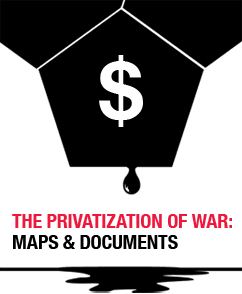The privatization of military services is a worldwide business
„The Privatization of War“
A mapping project done in collaboration with Lize Mogel, is published in the Brooklyn Rail this month. it's been scaled down and edited from a much larger size, but still suitable for framing. If you don't live in Brooklyn or can't find a copy of the Rail, you can also download the map online at: http://www.brooklynrail.org/2007-02/express/pirvatization
[The King of England] is at this time transporting large armies of foreign mercenaries to complete the works of death, desolation and tyranny, already begun with circumstances of cruelty and perfidy scarcely paralleled in the most barbarous ages, and totally unworthy the Head of a civilized nation. ¬¬¬—United States Declaration of Independence, 1776
Today, the privatization of military services is a worldwide business worth $200 billion a year. The mercenary armies so reviled by the authors of the Declaration of Independence have become today’s Private Military Contractors (PMCs), an acceptable part of many global economies. PMCs prefer to distance themselves from the term “mercenary,” to the point where they formed a powerful lobby called the International Peace Operations Association.
The first PMCs were formed some decades ago to assist with military logistics. During a boom in the 1990s, hundreds of companies were founded mainly by former military officers in the US (where the majority of PMCs are based), South Africa, Great Britain, Israel, Russia, France, Germany, Italy and others. Civilian companies also take on missions that are entirely part of the contemporary war machine. For example DHL, a German company which normally operates an international parcel service, provides cargo transport for the US Army and other contractors in Iraq.
The “products” PMCs offer nowadays range from logistics (i.e. building and managing military facilities and prisons) to strategic support (i.e. managing radar equipment or designing combat strategies) to open combat and special sabotage missions. Huge PMC conglomerates have been formed and are traded on the stock market, such as KBR (a subsidiary of Halliburton).
Hiring PMCs has various advantages for a government—as private corporations, they are less accountable to the public. In the United States, PMC contracts under $50 million do not need approval by Congress, although costs for military interventions do. American enlisted troops are accountable to military law; PMC operatives are not, as they are considered civilians. In addition, many contracts excuse them from civil prosecution.
As Myles Frechette, former US ambassador to Colombia, has observed, “It’s very handy to have an outfit not part of the U.S. armed forces. Obviously, if somebody gets killed or whatever, you can say it’s not a member of the armed forces. Nobody wants to see American military men killed.”
While it is bad “public relations” to see US soldiers dying, the death of PMC employees does not have as great an impact on public opinion. In Iraq, up to 2000 PMC employees have been killed to date. This death toll does not appear in military body count statistics.
The relationship between enlisted soldiers and private contractors during conflicts has changed dramatically over the last decade. During Gulf War I in 1991, one in 100 military personnel was a PMC employee. Currently, in Iraq, it is likely that one in six is a PMC employee—as many as 30,000 individuals are “on duty” in Iraq. The “coalition of the willing” has become the “coalition of the billing.”
If Iraq is a large-scale application of the privatization of war, then Colombia might be a functional laboratory for the concept. Colombia is rich in natural resources: oil, petrol, gold, emeralds, and water. It is the fifth-largest oil producer for the US and is the fifth-largest market for US goods in Latin America. 400 of the largest US corporations have investments in Colombia.
The conditions for “good business” are ensured by PMCs in cooperation with the Colombian army and police, cattle producers, narcotraffickers, paramilitaries, the US Army, the CIA, and the DEA. The US and Colombian governments, transnational corporations, and PMCs act in ever-shifting coalitions to undermine campesino organizations, unions and unionizing efforts, social movements, and the armed insurgency.
This type of “public/private partnership” is common in Colombia, where, for example, the Coca-Cola Corporation, Drummond Coal, and other enterprises work with paramilitary groups to menace union workers in order to crush organizing efforts. In the last 20 years, more than 3,000 union workers have been killed in Colombia by paramilitaries.
Approximately 20 PMCs are working in Colombia, funded by US Army contracts and the Pentagon. Some of these activities include the work of DynCorp, which works to eradicate coca and poppy plantations using crop dusters and herbicides. There is documentation that these heavily armed eradication efforts are also being directed towards food crop agriculture of small farmers that lie within areas with guerrilla presence. The CIA is operating under the cover of PMC California Microwave in order to detect guerilla units and pass on information to the Colombian army. The collective work of the PMCs, paramilitaries, and Colombian army has displaced more than 2.5 million people.
Colombia and Iraq are two key sites that exemplify PMC operations in the militarized world order.























